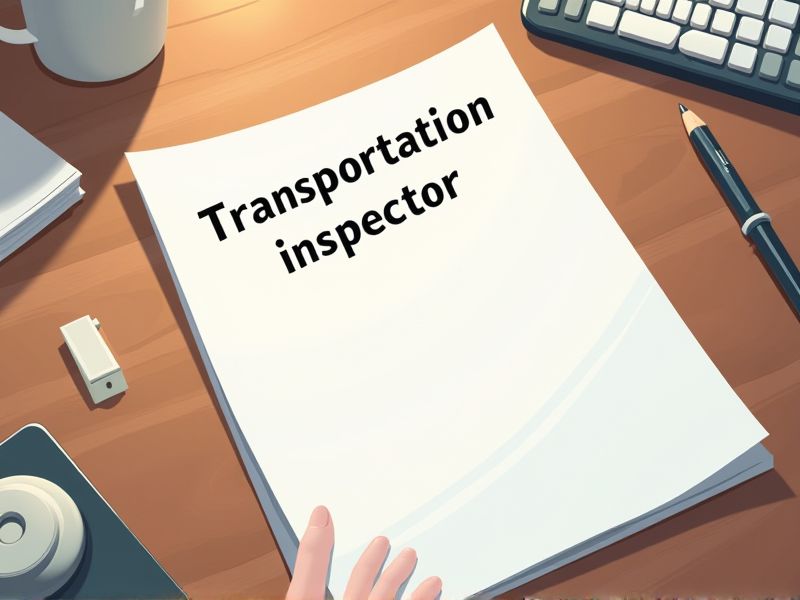
Transportation inspectors ensure the safety and compliance of vehicles and transport systems, which inherently necessitates a strong foundational understanding of regulations and technical knowledge. Without specific certifications, inspectors may lack the credentials to validate their judgments, potentially compromising the public's safety and trust. Certifications authenticate an inspector's expertise, signaling their ability to evaluate transport systems against industry standards effectively. Below are some essential certifications that could be required for a transportation inspector.
Certified Transportation Inspector (CTI)
Certified Transportation Inspectors are necessary because they possess specialized knowledge that ensures safety standards are meticulously adhered to in the transportation sector. Their certification confirms proficiency in evaluating complex regulatory compliance, which reduces risks of accidents and operational inefficiencies. With thorough assessments, CTIs help in the early detection of potential faults in vehicles or infrastructure, minimizing costly downtime. The presence of a CTI promotes trust and reliability among stakeholders and consumers by demonstrating a commitment to maintaining high safety and quality benchmarks.
FMCSA Inspection and Enforcement Certification
The FMCSA Inspection and Enforcement Certification equips transportation inspectors with the necessary skills to ensure compliance with federal safety regulations for commercial vehicles. Without this certification, inspectors might lack the comprehensive understanding required to identify and address violations effectively. Certification ensures a standardized approach to inspections, reducing the variability in enforcement and increasing road safety. The certification process enhances an inspector's credibility and capability, directly impacting the overall safety and efficiency of the transportation system.
Hazardous Materials (HazMat) Endorsement Certification
Hazardous Materials Endorsement Certification ensures transportation inspectors are trained to handle and identify dangerous substances safely. Proper certification helps minimize the risk of accidents by ensuring compliance with safety regulations and industry standards. It allows inspectors to effectively evaluate and mitigate potential hazards associated with transporting hazardous materials. Certification supports public safety by enhancing the inspector's capability to enforce rules and respond to emergencies involving hazardous materials.
Transportation Worker Identification Credential (TWIC)
The Transportation Worker Identification Credential (TWIC) enhances security by restricting access to secure and sensitive areas in the nation's transportation infrastructure. Possessing a TWIC allows a transportation inspector to perform audits and inspections at ports and maritime facilities without obstacles. The credential confirms a worker has undergone rigorous background checks, thus ensuring trustworthiness and safety in sensitive environments. It prevents unauthorized access, reducing potential security breaches and protecting critical transportation operations.
Certified Safety Professional (CSP)
By obtaining CSP certification, transportation inspectors demonstrate a comprehensive understanding of safety protocols, reducing the risk of accidents and improving overall transport safety. The rigorous CSP training equips inspectors with advanced skills to identify potential hazards, leading to more effective implementation of safety measures. Employers recognize the CSP as a mark of professional credibility, increasing employment opportunities and career advancement for inspectors. With the growing complexities in transportation systems, CSP certification ensures inspectors remain updated with the latest safety standards and practices.
Certified Quality Inspector (CQI)
Certified Quality Inspectors (CQIs) are crucial for transportation inspectors because they possess the skills to ensure compliance with safety and quality standards. Transportation projects involve complex systems where any oversight can result in costly delays and potential safety hazards. CQIs offer expertise in identifying defects and implementing corrective measures, which directly impacts the reliability and efficiency of transportation infrastructure. Their role in quality assurance helps maintain regulatory standards, enhancing public trust in transportation safety.
ISO 9001 Lead Auditor Certification
Obtaining the ISO 9001 Lead Auditor Certification equips transportation inspectors with the knowledge to assess and ensure compliance with international quality management standards. This certification enhances their ability to identify inefficiencies and non-conformities in transportation processes, leading to improved operational outcomes. Employers value this certification as it demonstrates an inspector's commitment to upholding high-quality standards, thereby reducing the risk of accidents and ensuring passenger safety. The certification also broadens career opportunities by enabling inspectors to conduct audits across diverse sectors that adhere to ISO 9001 standards.
Environmental Compliance Certification
Environmental Compliance Certification is necessary for transportation inspectors to ensure adherence to environmental laws and regulations, which helps minimize pollution and safeguard natural ecosystems. When inspectors possess this certification, they have the knowledge to identify and rectify violations, leading to reduced environmental damage caused by transportation activities. By understanding compliance requirements, inspectors ensure the transportation sector operates sustainably and meets governmental and global environmental standards. This certification enhances public trust in the transportation industry by demonstrating a commitment to environmental responsibility.
Regulatory Compliance and Auditing Certification
Transport inspectors require Regulatory Compliance and Auditing Certification to ensure adherence to local and international safety standards, which minimizes the risk of accidents and legal repercussions. Understanding specific regulations through certification enables inspectors to identify and rectify non-compliance efficiently, leading to safer transportation systems. Certified inspectors are more adept at conducting thorough audits, resulting in more reliable reporting and enhanced public trust. Acquiring such certification aligns inspectors with industry best practices, facilitating continuous improvement and operational excellence.
Environmental Health and Safety (EHS) Certification
EHS certification equips transportation inspectors with the necessary knowledge to identify and mitigate environmental hazards, directly impacting public safety. Companies gain a reputation for safety compliance, which can lead to increased customer trust and business opportunities. Regulatory bodies often require EHS standards as a part of legal compliance, reducing the risk of costly fines and legal issues. Employees feel more secure in their work environment, leading to higher job satisfaction and productivity.
Summary
Gaining certifications as a transportation inspector can enhance your career prospects. Certifications can improve your credibility, leading to greater trust from employers. With recognized credentials, you often unlock higher salary opportunities. Consequently, you might access more advanced roles with increased responsibilities.
